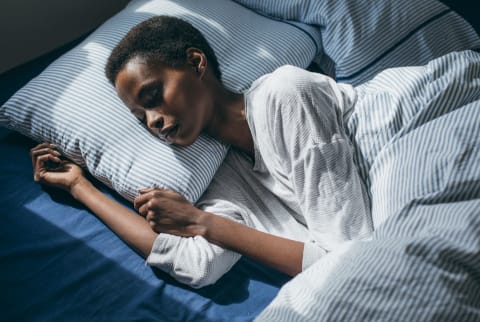Imagine for a moment a week in which you do nothing but indulge in the luxury of pampered sleep—replete with soft sheets of the finest quality, the soothing sounds of an ocean breeze, and a sleep butler to fluff your pillows and infuse the room with the calming scents of lavender or chamomile.
Sound dreamy? Well, maybe, but the cost of luxury sleep retreats may be enough to keep you awake at night. One sleep retreat that boasts stunning views of the Alps and Lake Geneva costs over $13,000 for five days, another in New York City costs around $3,000 per night, but you get to take the custom designed mattress home with you.
Fortunately, there are alternatives to this trend for those who are sleep-starved, but not well heeled. Think of it as a staycation, a DIY rest period in your own in-home, custom appointed sleep haven.
The growing trend toward sleep vacations reflects the increasing awareness that Americans live in a sleep-starved society, with over one-third of adults getting less than the recommended 7-9 hours of sleep per night, and even more consistently failing to get restful or restorative sleep on a regular basis.
On the positive side, however, society is slowly awakening to the value-added a good night’s sleep can bring. Sleep is increasingly viewed as a critical component of that ever-elusive construct known as self-care and, therefore, a worthy investment. In that vein, luxury sleep retreats are one way to provide a mind and body reset and learn strategies to support healthy sleep.
Sleep retreats typically involve a two- to 7-day immersive experience focused on rest and relaxation. The programs, which may or not be based on the best modern sleep science, may include a collection of activities, such as sleep assessments conducted (hopefully) by a trained sleep medicine provider, sleep education sessions, yoga and meditation options, aromatherapies and ayurvedic medicine, and even menu options not just for sleep-friendly foods but even for your pillows!
But for those who lack the time and money to jet off to Switzerland for a luxury week of rest, making a sleep retreat at home is doable and can help build good sleep habits that can yield enduring health benefits.
The key to creating a sleep haven in your own bedroom is to focus on comfort and simplicity. A central feature of a sleep retreat at a luxury resort is top-of-the-line bedding and mattresses. Without breaking the bank, you may want to consider upgrading your linens or mattress, especially if they have seen better days. After all, most people spend about one-third of their lives in bed, so it could be money well spent.
Beyond the bedding itself, what’s equally important is what you keep in your room and what you keep out. Free your sleep haven from clutter and the distractions of the day—that includes dirty laundry scattered on the floor or your phone by your bedside. All that detritus sends the wrong signal to the brain—rather than signaling a relaxing and comforting environment, those cues can trigger stress and anxiety. The bedroom should be for sleep and sex–keep it simple and inviting, your haven within your home.
Once you’ve got your nest adequately feathered, it’s time to focus on the actual business of sleeping. Falling asleep is not like switching off a light switch. It is a complex physiological process that involves a slow descent into slumber. While you may not have access to all of the offerings at a luxury sleep retreat, like personalized yoga or meditation sessions, there are many strategies to create a soothing bedtime ritual, including apps to coach you on meditation, yoga, or deep breathing exercises.
Equally important as a wind-down routine, is a ritual to for getting up. Even in your DIY sleep retreat, you’re still going to be awake a good portion of the time. If you’re getting up, do it. Get your feet on the floor and get out of bed, then make the bed. Get as much light exposure as you can in the morning as light stimulates alertness and energy and helps to regulate your internal biological clock. Listen to upbeat music, give your partner a cuddle, or indulge in a really good cup of coffee.
Whether embarking on a sleep vacation or creating one in your own home, making intentional steps to prioritize sleep is one of the best investments you can make in your own health and well-being. In either case, the key is to make these healthy sleep behaviors enduring habits that you practice day in and day out, even when the vacation ends.
Dr. Wendy Troxel is a senior behavioral and social scientist at the nonprofit, nonpartisan RAND Corporation, an adjunct faculty member at the University of Pittsburgh and University of Utah and author of “Sharing the Covers; Every Couple’s Guide to Better Sleep.”








